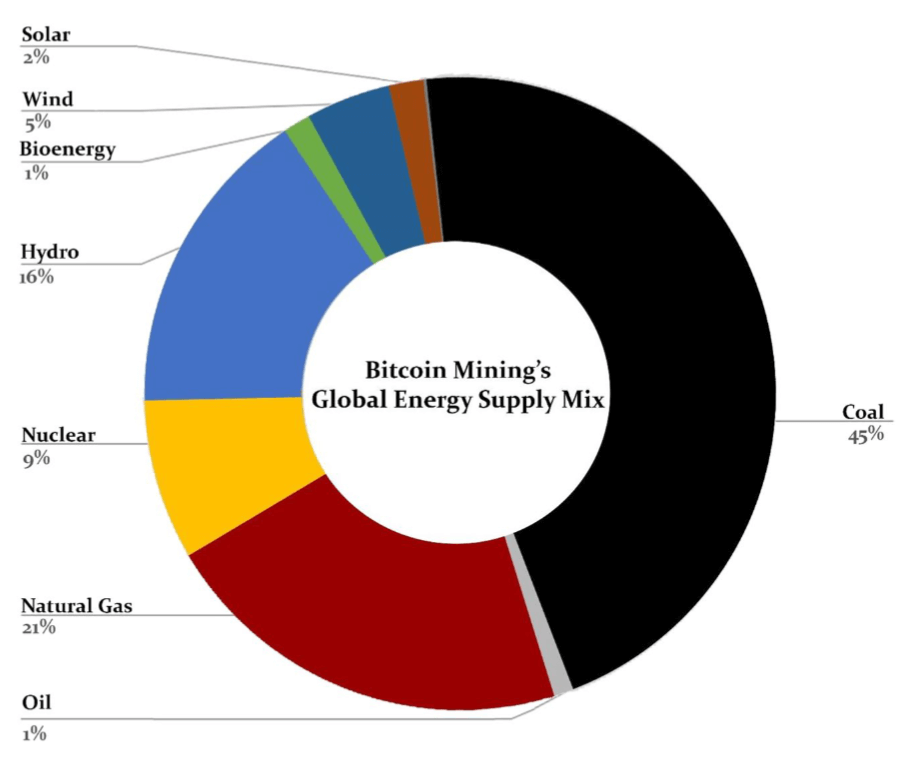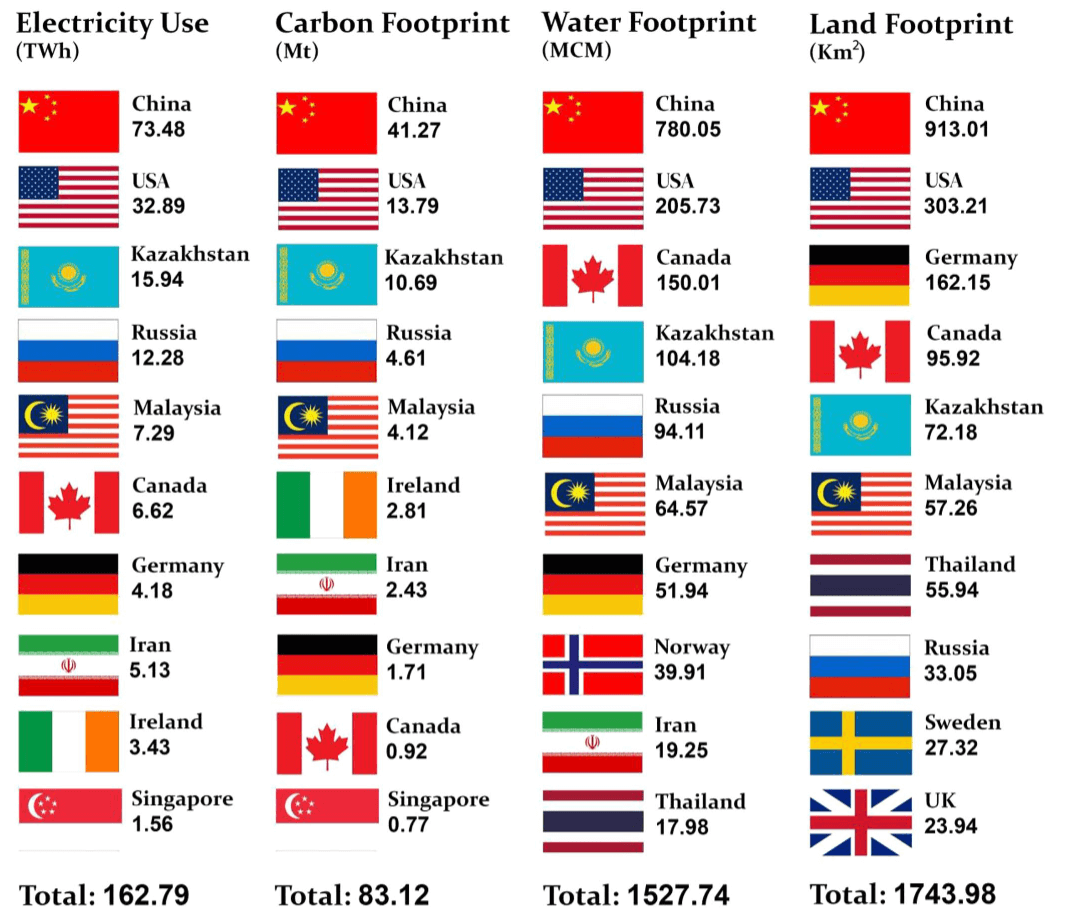TOKYO, Japan — A new United Nations study reveals that the United States and China have the largest Bitcoin mining footprints in the world. While this currency may be digital — it’s apparently significantly impacting the environment. The study explores the environmental consequences of Bitcoin mining, considering factors such as energy usage, carbon emissions, water consumption, and land use for 76 countries involved in Bitcoin mining.
Bitcoin and other cryptocurrencies have come under scrutiny for their substantial carbon footprint and energy consumption.
“A lot of our exciting new technologies have hidden costs we don’t realize at the onset,” says study author Kaveh Madani, a director at United Nations University, in a media release. “We introduce something, it gets adopted, and only then do we realize that there are consequences.”
The research covered data from 2020 to 2021, and Bitcoin mining was chosen for its prominence and well-established status among cryptocurrencies.
The study’s findings indicate significant environmental impacts related to Bitcoin mining. Over the two-year period from January 2020 to December 2021, Bitcoin mining consumed approximately 173 terawatt hours of electricity, ranking it 27th globally in energy use. This represents a 60 percent increase in energy consumption compared to 2018-2019. Carbon emissions from Bitcoin mining reached approximately 86 megatons, largely due to the prevalence of fossil fuel-based energy in mining countries.

China, the United States, and Kazakhstan were the top three countries with the largest energy and carbon footprints in 2020-2021.
In terms of water usage, Bitcoin mining globally consumed 1.65 million liters (about 426,000 gallons) in 2020-2021, equivalent to more than 660,000 Olympic-sized swimming pools. China, the United States, and Canada had the highest water footprints, with Kazakhstan and Iran also making the top 10 list.
“These are very, very worrying numbers,” notes Madani. “Even hydropower, which some countries consider a clean source of renewable energy, has a huge footprint.”
The study also analyzed land use, primarily focusing on the land area affected by energy production for mining. Server farms themselves have a negligible land footprint. Globally, Bitcoin mining had a land footprint of 1,870 square kilometers (722 square miles), with China’s footprint accounting for 913 square kilometers (353 square miles). The United States had a land footprint of 303 square kilometers (117 square miles), and it is likely expanding while China’s is shrinking.

China and the United States ranked highest across all environmental factors, with other countries rounding out the top 10. Some countries, like Kazakhstan, Malaysia, Iran, and Thailand, are significant players in outsourced server hosting and, in some cases, government-subsidized cryptocurrency mining.
“It’s hard to know exactly who is benefiting from this,” says Madani. “The issue now is who is suffering from this.”
While Bitcoin mining can potentially benefit some individuals or entities, the study highlights that the geographic distribution of environmental impacts doesn’t necessarily align with the ownership of digital assets.
The study is published in the journal Earth’s Future.
Bitcoin: A digital currency
Bitcoin is a digital currency, also known as a cryptocurrency, that can be used to buy goods and services online or in-person. It is decentralized, meaning it is not subject to government or financial institution control. Bitcoin is also relatively anonymous, as users are not required to provide their personal information when making transactions.
Bitcoin is created through “mining,” in which computers solve complex mathematical problems to verify transactions and add them to the Bitcoin blockchain. The blockchain is a public ledger that records all Bitcoin transactions, making it difficult to counterfeit or double-spend Bitcoin.
Bitcoin is a volatile asset, meaning its price can fluctuate wildly. However, it has also been a very profitable investment for some people. Bitcoin has the potential to revolutionize the way we pay for goods and services, and it is becoming increasingly popular around the world.
How Bitcoin works
Bitcoin is based on a technology called blockchain. A blockchain is a distributed database that is shared among the nodes of a computer network. As a result, blockchains are very secure and difficult to tamper with.
When a Bitcoin transaction is made, it is broadcast to the network of Bitcoin nodes. The nodes then verify the transaction and add it to the blockchain. Once a transaction is added to the blockchain, it is irreversible.
Bitcoin transactions are secured by cryptography. Cryptography is a mathematical technique that can be used to encrypt and decrypt data. When a Bitcoin transaction is made, it is encrypted using the sender’s private key. The receiver can then decrypt the transaction using the sender’s public key.


Is somebody holding a grudge here? (lost your savings in attempt to speculate?)
How about comparing to other mining operations on water use?
Or compare to other banking and commerce on electrical power?
And how are anything using electrical power, responsible for the power-generation mix (isn’t that the politicians responsibility)?
A few facts that is omitted (or not understood very well apparently), is that “amount of transactions” is Not affecting electrical power use. The power usage is tied to the size of the node network and also the type of nodes.
Mining nodes use absolutely the major part of energy here, and could potentially be licensed (and limited) by governments if they wanted. The network can still function even if only 7-13 small miners (600-800W ) were the only thing connected to it.
The accounting nodes are ordinary pc’s – not doing much other than keeping track on transactions – which can be compared to browsing Facebook or Google, in terms of power use.
Of cause, if the miners were limited in numbers and size and the network consisted mostly of accounting nodes, then the balance of power use in the network would shift the other way – in a very reduced power-use state too.
I am NOT proposing to shift from any currently used currency to bitcoins, or betting the house on any crypto market. But I am offended by the obvious bias and blaming here.
Best regards
Jakob
Jakob – I also noted the lack of comparison to the traditional banking system. There is no mention of the worldwide private network with multiple massive storage nodes that power credit card systems like Visa and Master. Nor is there any mention of the offices and personnel needed to regulate these systems. While I do not have the numbers, I am somewhat familiar with these operations, and I suspect Bitcoin is a tiny energy user compared to the standard banking system. Someone needs to update this study to compare these numbers so people can understand that human endeavors depend on a generous energy supply. Banking and money transactions are no exception.